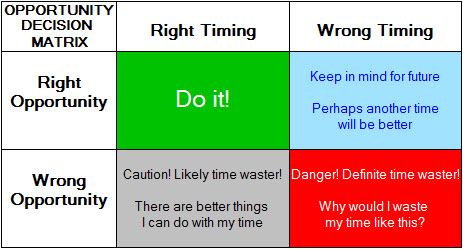Have you ever asked yourself, "self, why did I waste my time in that way?"
I've done both. Many times.
As I continue to do research in high performance knowledge work and personal knowledge management, I've collected a number of tools and methods to help me make smarter decisions about what to do or not do.
Today, I'd like to share one of those tools with you. I call it my opportunity decision matrix,
When I was in graduate school and trying to run my consulting business and launch a software company and be a loving husband and father to my four daughters, I hit a wall. Something had to give. But what?
My good friend, Michael, gave me some sage advice that helped a lot. He told me to ask myself two simple questions to ask whenever I needed to evaluate options.
Here's how this works:
First define the "opportunity". Perhaps it's "Attend ABC conference". Next, evaluate that opportunity through the lens of two filters: opportunity and timing, like this:
Question #1. Is this the right opportunity?
If it isn't, stop. Don't waste your time. Done. Decision made. If it is the right opportunity, then, I continue to question #2
Question #2. Is this the right timing?
Many times, I have a right opportunity but bad timing. It makes no sense to proceed unless both the opportunity and timing are right.
I have since expanded into an this 2x2 opportunity decision matrix:

This matrix has proven extremely valuable to me when I have a lot of hard choices to make and a new one shows up (like, "hey, do you want to fill in the blank.... ?")
For example, at a particularly busy point in my life, I got invited to speak at a conference. It was a great opportunity and I really wanted to go. However, it was not the right timing, so I declined. Having this simple two question matrix really helped me make a hard decision easy.
The following year I was invited to speak at a different event. I concluded that it was both the right opportunity and the right timing, so I accepted the invitation and the "Beyond Planning Conference" was born.
Sometimes, when it seems like I have many large or complex decisions to make, It helps me to pull out a sheet of paper and make a 4x4 matrix, like the one above. Then, I list of all of the options on my plate and one by one, and I write them into the appropriate quadrant.
It's usually quite a sobering experience.
Next, I cross off everything in quadrants 3 & 4 and move quadrant 2 items to my "someday/Maybe" list. This leaves me with only my quadrant 1 items, which I do.
By being ruthless in evaluating all of my choices against these two criteria, I can get unstuck quickly and feel good about the choices I make.
How do you make choices? What tools have you found helpful to make decisions?






